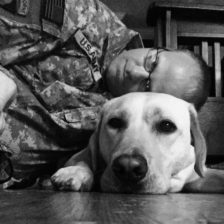I have to admit, there are a lot of “awareness” days that go on throughout the year. I didn’t know until I read an article there was a TBI awareness month. March is National Brain Injury Awareness month.
I know there might be a few people who may not know about TBI, or brain injury. Sam suffers from traumatic brain injury due to his time in the military. Most of it is the result of having a serious jolt to the head. Exposures to blasts are a leading cause of TBI among active duty and retired military personnel…as a result from being in war zones.
Many TBIs treated by military physicians are a result of vehicle collisions, falls, or even accidental discharge of weapons.
There a a few types of TBI–one being mild where there is loss of consciousness and confusion or disorientation that is shorter than 30 minutes. When someone suffers mild TBI there can be problems cognitively–headaches, memory problems, attention deficits, mood swings, and frustration.
Sam now suffers from mild TBI. When he was in the military he had concussions from head trauma (bleeding ears). He suffers from short-term memory loss, and is average with long-term memory. A task one might view as simple or easy (like taking out the trash on a designated day, being told something to do like, “pick up a gallon of milk at the store”) might be hard for someone with TBI to remember.
Severe TBI is an injury that is associated with loss of consciousness for more than 30 minutes and memory loss after the injury or penetrating skull injury is longer than 24 hours.
A TBI can change a person–Sam relies on his phone to remind him of daily tasks. Keeping a calendar is very important too for various dates, bill payment reminders, meetings, etc. Sometimes we have a routine we go through in the morning where I make sure he has everything he needs for the day (even his ID badge and wallet go on that list).
When Sam is at work or in class, he may have difficulty staying on task—remembering things he has read—keeping notes or reminders of assignments, etc. can be helpful for him. Distractibility and confusion can sometimes take place because of the TBI.
Sam went through various types of therapy and even experienced speech therapy to help with his memory.
While TBI can be described as an invisible wound, it is one that is very real and unfortunately prevalent for some veterans. It is important to understand the types of brain injury and realize that there can be physical changes for someone who suffers from TBI, difficulty with hearing or speech and language.
It is sometimes hard to comprehend what our veterans face during their deployments or time in the military. Taking time to do some reading and research can be helpful.

